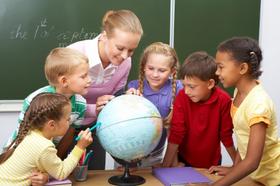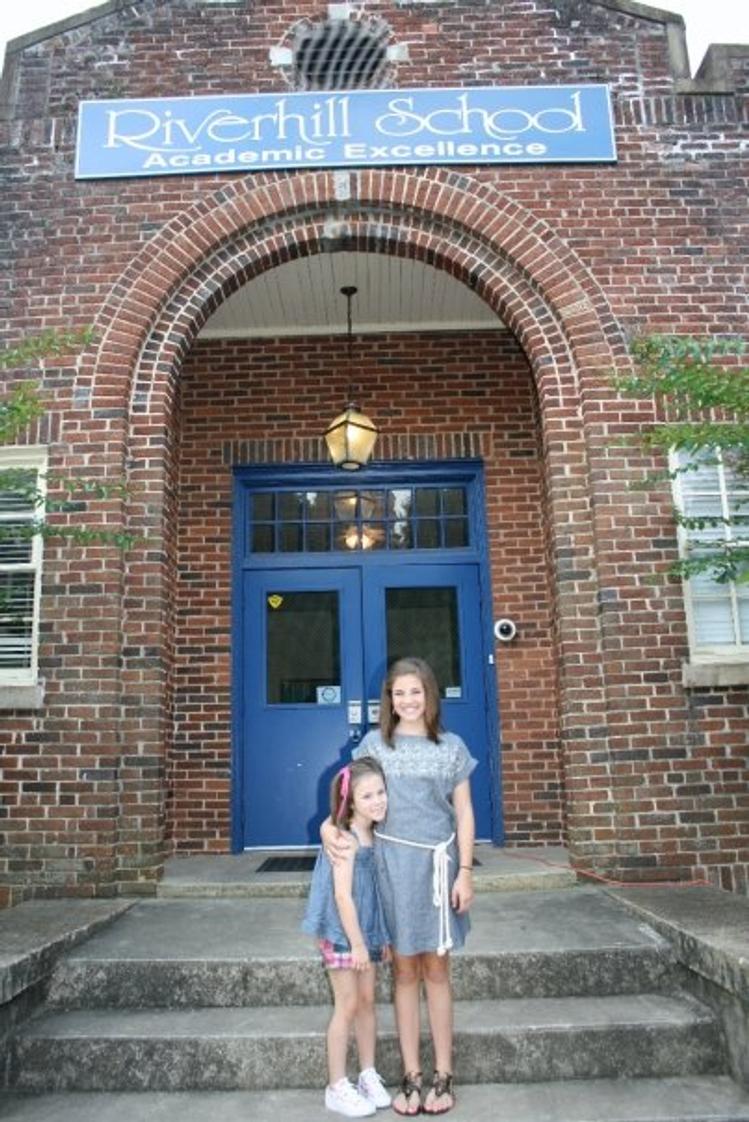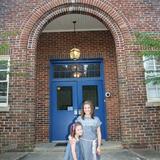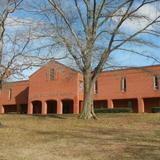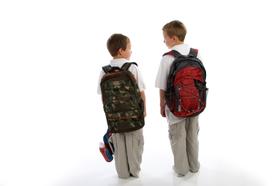Quick Stats (2024)
- Grades: Prekindergarten-6
- Enrollment: 185 students
- Average class size: 14 students
- Application Deadline: None / Rolling
- Source: Verified school update
School Overview
Student Body
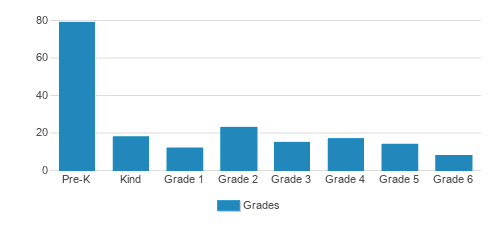
Academics and Faculty
"Common Sense" Dress Code
Tuition and Acceptance Rate
Sports
Extracurriculars
Club or Organization:
Art Club, Duke Talent Search, Geography Bee, Lego Builders Club, National Elementary Honor Society, Scholars Bowl, Student Government Association, Technology Teams
Arts and Music Programs:
Show Choir
School Notes
- Academics:
- Though we follow the Alabama course of study we have the flexibility to accelerate and enhance the curriculum to maintain an academically elite instructional program which is rigorous and challenging for all students.
- Assessment:
- To measure student success and to evaluate Riverhill`s teaching practices and instructional methods, the Stanford Achievement Test (SAT) and a writing assessment is administered in the spring of each school year to all grades beginning with Kindergarten. The data collected is disaggregated and reviewed by administration and staff and used as a basis for on-going evaluation of instructional planning effectiveness.
- Course Descriptions:
- Academically Focused Preschool Program:
- Pre-K2: In the Pre-K2 program, the seeds are planted for a lifetime desire for learning by developing language and cognitive skills, a positive self-image, independence, and responsibility for self, and an appreciation of the arts and creativity. Active thinking and purposeful play facilitated by quality teaching practices provide the basis for meaningful and long-lasting learning. Daily opportunities are provided for children to participate in challenging and educationally stimulating activities. In addition to classroom time, students in the Pre-K2 program will participate in foreign language, art, and music each week.
- Pre-K3: The Pre-K3 classroom is designed to promote collaboration and hands-on exploration. The academic curriculum includes an emphasis on phonological awareness, early literacy, and understanding of numerical concepts. The curriculum is developmentally appropriate and fosters creativity and individual expression. Thematic units promote social, emotional, physical, and cognitive growth. Students in the PreK-3 class participate in art, music, foreign language, library/technology weekly. Each child`s individual rate of development is accepted and nurtured in a safe, nurturing environment. The PreK-3 learning environment provides the opportunity for each child to reach their maximum growth potential during the course of the year.
- Pre-K4: PreK-4 is a loving environment where children develop self-confidence, self-discipline, social skills, and an organized approach to problem solving and thinking. The classroom climate promotes a sense of security and fosters creativity and independence. The Pre-K4 curriculum emphasizes word, reading, and writing readiness, and basic math computation, while instilling a love of lifelong learning. Pre-K4 students participate in art, music, foreign language, and library/technology classes each week. Science experiments, field trips, and outdoor learning experiences enhance the curriculum.
- Elementary School Program:
- Kindergarten: Kindergarten is an exciting and important time for children, a time to nurture an innate love of learning and curiosity about the world. The Kindergarten curriculum provides a strong foundation for future success by continuing to refine the students` reading, language arts, and mathematical skills. In-depth science and social studies units compete the core curriculum. The students learn to be independent, caring, and responsible citizens. Classroom activities focus upon helping others through our Community Service Projects developing a respect for others and an appreciation of diversity.
- First Grade: In First Grade, students are continually challenged to reach their full potential through a research-based curriculum enhanced by on-going teacher-student interaction. Instructional methods include whole group and small group instruction. Cooperative learning groups provide students a chance to interact with their peers and to solve problems collaboratively. The core curriculum emphasizes reading skills to build a solid foundation for reading, math, science, and social studies. The components of the reading program include phonics, spelling, and writing. The social studies and science curriculum incorporates hands-on activities to providing an opportunity for students to learn by discovery. First Grade students learn the meaning of respect of self, others, school, and the community through teacher modeling and positive peer interaction.
- Second Grade: The Second Grade curriculum encompasses a comprehensive reading, language arts, and mathematics program. The literature-based reading program focuses literacy, phonics, fluency, and comprehension. The language arts curriculum emphasizes communication, oral and written, and is fostered through learning experiences designed for small groups and whole class situations. In mathematics, students learn to reason moving from the concrete to the abstract. They learn how to measure, manipulate data, and graph to present information. Students develop critical thinking skills to be successful in solving real word problems. Social studies and science units of study are enhanced by hands-on learning activities and collaborative projects. The Second Grade program encourages student creativity, exploration, problem-solving, and cooperative learning.
- Third Grade: The Third Grade Academic program combines skill building, social experiences, and interactive activities. The reading and language arts curriculum includes reading chapter books and discussing stories while incorporating the development and mastery of reading skills such as vocabulary development, comprehension, and writing, The mathematics program is a challenging and exciting experience, developing critical thinking and problem solving skills through exploration of a variety of topics, including place value, fractions, measurement, and geometry. Thematic units in Science and Social Studies round out the core curriculum of Third Grace. A hands-on approach is used in Science to make learning more meaningful. Social Studies includes field trips, guest speakers, and projects to create an authentic learning environment. The students` emotional and social growth is fostered through a comprehensive character education program.
- Fourth Grade: The Fourth Grade Curriculum expands and deepens students` knowledge of reading, mathematics, and language arts. The foundation of the reading curriculum is comprised of the skills and strategies that lead to early independence and decoding, comprehension, and critical thinking. Students are exposed to a variety of literary genres including fiction, non-fiction, informational, and poetry. The writing program spans across the four forms of writing, including expository, persuasive, narrative, and descriptive. Our comprehensive mathematics curriculum utilizes a problem solving approach, encouraging students to use math to solve real-world problems. The science program provides opportunities for students to develop skills necessary to function productively as problem solvers in a scientific and technological word. The Social Studies curriculum enables students to acquire an appreciation for diversity. The Fourth Graders enjoy an expansion of freedoms and privileges in preparation for their middle school years.
- Fifth Grade: Fifth grade is an exciting year of growth and discovery. The reading program is novel-based, and students become better readers and writers through their study of English and composition. Independent study skills are an important part of the curriculum in science and social studies. Math expands upon students` basic arithmetic skills emphasizing problem-solving and critical thinking for the purpose of developing a better understanding of mathematical concepts. Science introduces new skills and concepts through both reading and hands-on activities. Science is lab-based, and the students are introduced to Chemistry and Biology through experiments and dissection. A variety of learning styles are explored in social studies using cooperative learning, creativity, and independent study. In 5th grade learning is fun, creative, positive, and challenging. Students gain increasing independence and confidence a they make the gradual transition into middle school years.
- Sixth Grade: Sixth graders enjoy expanding their horizons through a variety of increased responsibility, opportunities for leadership, challenges, and freedoms. The comprehensive language arts program incorporates language concepts necessary for successful written and oral communication. Using the skills learned, students write narrative, persuasive, expository, and descriptive essays. Writing and public speaking skills are integrated throughout the 6th grade curriculum. The reading program is novel-based and encompasses various genres, focusing on higher order thinking skills, analytical reasoning, and comprehension strategies. The math program leads students through a series of increasingly complex concepts toward a mastery of higher level thinking skills and real-world application. In Science our students are challenged to examine the world by using scientific methods to observe, examine and participate in labs on a variety of topics. The inquiry-based science program allows for students to be actively engaged in the learning process developing problem solving strategies and critical thinking skills. In Sixth Grade, students begin their study of American history and classroom discussions are enhanced by opportunities including field trips and collaborative projects.
- Riverhill School Pre-K2 Program:
- Meets DHR requirements for certification
- All staff are CPR and first aid certified
- Foreign language, art, music, and physical education included in the program
- Program is academically focused, incorporating developmentally appropriate activities and learning experiences
- 3 Enrollment Options: *All options are 8 am- noon each day OR 8 am-3:00 pm
- (2 days per week): Mondays and Wednesdays
- (3 days per week):Tuesdays, Thursdays, and Fridays
- (5 days per week): Monday-Friday
- Students will be offered a mid-morning snack and a lunch at a minimal cost.
Riverhill School
Tuition and Fees
While Riverhill is a tuition-supported school, our success relies on support from many other sources. In addition to tuition, we welcome gifts from parents, alumni, and community, as well as RAPS fundraisers.
We assist in creating an optimal monetary situation for every applicant family, but the dollar investment in an independent education does not begin to cover the true cost of a quality education.
Pre-K2 2 day option | Pre-K2 3 day option | Pre-K2 5 day option | PK3 | PK4 | Kindergarten | First Sixth Grades |
Tuition | $2750* | $3300* | $4000* | $4550 | $5100 | $5500 |
Supply Fee | $250 | $250 | $500 | $500 | $500 | $500 |
Tuition
- Payment plans
One-payment option prepaid tuition is due on or before July 15. Families choosing this option will receive a $150 discount for tuition paid in full on or before July 15th.
Two-payment option 50% of tuition is due on or before July 15 and the remaining 50% is due on or before December 15.
Monthly payment option--Tuition is divided into ten (10) monthly installments. Each installment is due by the 15th of the current month. (August - May)
Sibling Discounts A sibling discount of $300 will be given for siblings in grades 1-6 and a $150 discount will be given to siblings in pre-k classes and kindergarten. The oldest sibling will pay full tuition while subsequent sibling tuitions will be given the sibling discount.
Supply Fee
This fee covers textbook usage, workbooks, classroom materials and supplies as well as consumable paper products. One-half the Supply Fee is due when enrollment contracts are submitted.
Additional Expenses
Application fee As noted under Admissions Procedures, a non-refundable application fee is required for all new students.
Lunchesand snacks Lunch prices for students in pre-k and kindergarten classes are $3.00 per day and are $4.00 per day for students in grades 1st-6th. Students in all classes are offered a daily snack at a minimal cost.
Trips Students have opportunities throughout the school year to participate in a variety of educational trips. These are optional and range in cost.
Frequently Asked Questions
What sports does Riverhill School offer?
When is the application deadline for Riverhill School?
School Reviews
Endorse Riverhill School. Endorsements should be a few sentences in length. Please include any comments on:
- Quality of academic programs, teachers, and facilities
- Availability of music, art, sports and other extracurricular activities
- Academic or athletic awards
Recent Articles

